Co-editor Aaron Barrell asks “And what force can a magazine of poetry have in this world?” and later promises that “each poem in these pages will offer sustenance.” I am inclined to agree. I would add to that the visual art on the pages of this issue of Poetry Northwest. Commanding and stunning, the images strike with a bold knowledge of beauty, joy, and heartbreak. Joe Wankelman’s photograph “Lines” arrests with cautious veracity. The works of photography and artwork in this issue are acute in their understanding of different realities.
NewPages Blog
At the NewPages Blog readers and writers can catch up with their favorite literary and alternative magazines, independent and university presses, creative writing programs, and writing and literary events. Find new books, new issue announcements, contest winners, and so much more!
Southern Poetry Review – 2016
If I were to give this issue of Southern Poetry Review a title, it might be “Profound Perspectives” or “Meaning in the Moment.” The poems in this issue find moments of awe in life events and transport them from the mundane through reflection to the place where art lives in all its weighty insightfulness and magic. The poets accomplish this with rich imagery, carefully controlled lines and stanzas, and an attention to the natural rhythm of language.
Spread the word!
Poet Lore – Fall/Winter 2016
“Home is the place where, when you have to go there, they have to take you in.” Robert Frost knew all too well that home is not always the place where one has chosen to be but is the place where one is, if not welcomed, at least allowed in. The poems in this issue of Poet Lore were meant to be together and fall under an umbrella theme of home; they deal with relationships of people and places inspired by or in reaction to the word home and all of its connotations. They explore the many manifestations of home in memories and observations tinged with bitter nostalgia, unapologetic and raw.
Spread the word!
2 Bridges Review – Spring 2016
In her extended interview with George Guida featured in this volume of 2 Bridges Review, poet Kim Addonizio references Macbeth’s speech about how life is a poor actor, strutting and fretting about the stage for his brief moment of fame before fading away to nothingness. With these words, Addonizio seems to have set the unifying theme of this volume; on its pages, beginning with the cover, readers find writers and artists exploring the ways in which people strut and fret.
Spread the word!
The Antioch Review – Summer 2016
Let’s go back seventy-five years and meet ourselves again—because, as The Antioch Review has proven in its special anniversary edition, we did not hold the mirror closely enough back then, and we did not hear the message presented so clearly in the writings of people like Ralph Ellison, who laid before us in no uncertain terms our racial disparities and injustices, and in the poetry of that age. As Sidney Alexander explains in the poem “Prologue to Bolivar,” originally published in the autumn of 1944, we must “Roll back the dusty scroll, for no man lives / without his past: no man moves alone: / No man skates on time as if it were a film, but sees below him when the waters clear / the endless processionals of the dead.”
Spread the word!
The Sewanee Review – Summer 2016
While reading the summer issue of The Sewanee Review, I decided to poke into some historical trivia. It was founded in 1892 and devoted to book reviews, theology, political science, literature and such. Poetry didn’t appear until 1920, and the Winter 1966 issue, at almost 1,000 pages, was devoted to T. S. Eliot.
Spread the word!
Kestrel – Spring 2016
The Spring 2016 issue of Kestrel, a journal of literature and art out of Fairmont State University in West Virginia, includes a broad selection of poetry, an entertaining collection of short stories, and a fascinating group of art works. I know, that sounds like a pretty clichéd opening; the content, however, does not permit using novel exaggeration and false praise. It’s just good work that needs noting quickly and energetically. The work is definitely energetic.
Spread the word!
The Louiseville Review Celebrates 40 Years
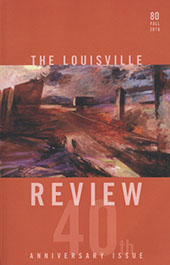 The Louisville Review celebrates 40 years of continuous publishing with its Fall 2016 issue. In her Editor’s Note, Sena Jeter Naslund writes, “When I first held the newborn literary magazine in my hands, with great joy and satisfaction in 1976, and placed it alone, upright and wobbly on my office shelf, I thought, Someday there will be a whole row of this journal. That vision has come true, thanks to the initial support of the University of Louisville, the diligence of Karen J. Mann and myself in fundraising and cost-cutting, and to the generous continuing support of both the magazine and our Fleur-de-Lis Press by Spalding University. I thank these institutions, and Karen, the writers who have contributed their work to these eighty issues, and the enthusiastic readers over the last forty years.” Thank you TLR and congratulations!
The Louisville Review celebrates 40 years of continuous publishing with its Fall 2016 issue. In her Editor’s Note, Sena Jeter Naslund writes, “When I first held the newborn literary magazine in my hands, with great joy and satisfaction in 1976, and placed it alone, upright and wobbly on my office shelf, I thought, Someday there will be a whole row of this journal. That vision has come true, thanks to the initial support of the University of Louisville, the diligence of Karen J. Mann and myself in fundraising and cost-cutting, and to the generous continuing support of both the magazine and our Fleur-de-Lis Press by Spalding University. I thank these institutions, and Karen, the writers who have contributed their work to these eighty issues, and the enthusiastic readers over the last forty years.” Thank you TLR and congratulations!
Spread the word!
Lit Mag Covers :: Picks of the Week
 Jorge Mayet’s De Mis Vivos y Mis Muertos (2008, electrical wire, paper, acrylics, fabric) is featured on the cover of the poetry journal Field‘s fall 2016 issue. Inside, readers can find a symposium on the work of C.D. Wright, with essays by Jenny Goodman, Laura Kasischke, Pamela Alexander, Sharon Olds, Kazim Ali, and Stephen Burt.
Jorge Mayet’s De Mis Vivos y Mis Muertos (2008, electrical wire, paper, acrylics, fabric) is featured on the cover of the poetry journal Field‘s fall 2016 issue. Inside, readers can find a symposium on the work of C.D. Wright, with essays by Jenny Goodman, Laura Kasischke, Pamela Alexander, Sharon Olds, Kazim Ali, and Stephen Burt.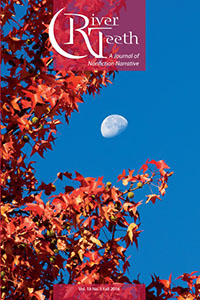 This fall 2016 cover of River Teeth: A Journal of Nonfiction Narrative features the photography of David FitzSimmons, “Sweet Gum and Moon, Ashland, Ohio.”
This fall 2016 cover of River Teeth: A Journal of Nonfiction Narrative features the photography of David FitzSimmons, “Sweet Gum and Moon, Ashland, Ohio.”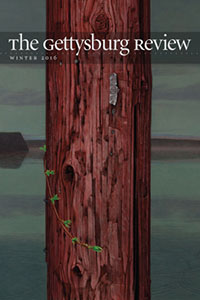 In keeping with what seems to be a ‘tree’ theme, this acrylic on panel by Eric Green, entitled “Pole,” is just sample of the kinds of stark yet lush images included in his full-color portfolio inside The Gettysburg Review, winter 2016.
In keeping with what seems to be a ‘tree’ theme, this acrylic on panel by Eric Green, entitled “Pole,” is just sample of the kinds of stark yet lush images included in his full-color portfolio inside The Gettysburg Review, winter 2016.
Spread the word!
Books :: 2016 WWPH Fiction Prize Winner
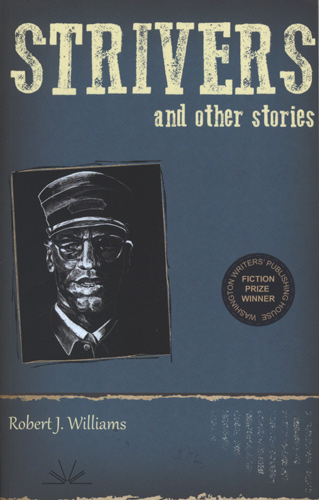 At the beginning of the month, Washington Writers’ Publishing House published the winner of the 2016 Fiction Prize: Strivers and Other Stories by Robert J. Williams.
At the beginning of the month, Washington Writers’ Publishing House published the winner of the 2016 Fiction Prize: Strivers and Other Stories by Robert J. Williams.
From the publisher:
Set between the 1920s and the present day, Strivers and Other Stories explores a range of African-American and Southern voices reflecting characters striving towards their versions of the American dream. In 13 stories, we meet teachers and doctors, train porters and factory workers, soldiers and musicians; mothers, fathers, children and spouses; mentors and mentees. With a mix of humor and heart, satire and sentiment, this collection captures their everyday struggles for better lives and their hopes for promising futures.
Learn more at the publisher’s website.
Spread the word!
Books :: Fall 2016 Book Award Winners
The fall season seems to be flying by, so let’s hit pause to look back at the award-winning books published in the past few months.
Back in September, Truman State University Press published Daughter, Daedalus by Alison D. Moncrief Bromage, winner of the 2016 T. S. Eliot Prize Winner. Jennifer Clement, contest judge, calls the collection “both original and very often masterful,” with an “elevated High Church intention [ . . . ] that T. S. Eliot would have recognized.” Copies are available digitally and in print at the press’s website.
Also published in September was the winner of Southeast Missouri State University Press’s Nilsen Prize for a First Novel: Rules for Lying by Anne Corbitt. Rules for Lying is a timely novel that explores the accusations and characters involved in an alleged rape, and how the families and the town they live in react, incriminate, and take sides. More information is available at the publisher’s website.
Moving on to October, Allegra Hyde’s Of This New World, winner of the John Simmons Short Fiction Award, was released. Judge Bennet Simms calls it “an ambitious and memorable debut.” In twelve stories, Hyde writes with a mix of lyricism humor, and masterful detail. Check out the University of Iowa Press website for more information.
And finally, Josh Rathkamp won the 2016 Georgetown Review Press Poetry Manuscript Contest with his collection A Storm to Close the Door. Terrance Hayes calls the collection stunning with poems that “are often quick-witted and charming, but they never shy away from their meditations and quotidian American blues.” SPD has A Storm to Close the Door available for purchase.
Spread the word!
Books :: 2015 Noemi Press Poetry & Fiction Award Winners
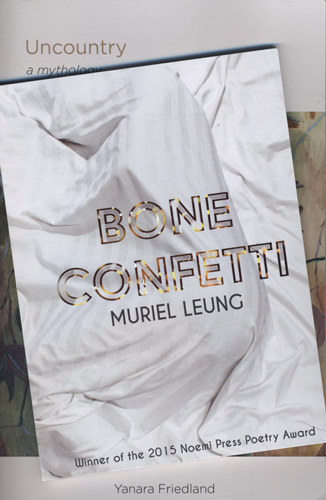 This past October, Noemi Press released the winner of the 2015 Noemi Press Poetry Award: Bone Confetti by Muriel Leung. Leung’s first poetry collection, Bone Confetti reveals “there are two types of survivors at the end of the world.” Ash confetti “floats between funeral and parade, wedding and hell. When all that is left is the terrible residue of memory, lovers and ghosts try their best to make do [ . . . ] in an attempt to fashion a new sense of humanity.” Check out the Noemi Press website for more information and copies.
This past October, Noemi Press released the winner of the 2015 Noemi Press Poetry Award: Bone Confetti by Muriel Leung. Leung’s first poetry collection, Bone Confetti reveals “there are two types of survivors at the end of the world.” Ash confetti “floats between funeral and parade, wedding and hell. When all that is left is the terrible residue of memory, lovers and ghosts try their best to make do [ . . . ] in an attempt to fashion a new sense of humanity.” Check out the Noemi Press website for more information and copies.
Looking ahead to December, the 2015 Winner of the Noemi Press Fiction Award will be released. Uncountry: a mythology by Yanara Friedland. The novel is “a collection of narratives that aim to expand creative pathways into historical space, particularly histories of migration and displacement.” Divided into four sections, each section explores “The gaps bweteen ‘remembered’ official history and the more unreliable spaces of private memory and unspoken unofficial history.” Copies of Uncountry are available for pre-order at the Noemi Press website.
[Quotes from SPD website]
Spread the word!
Books :: Pint-Size Publications First Book
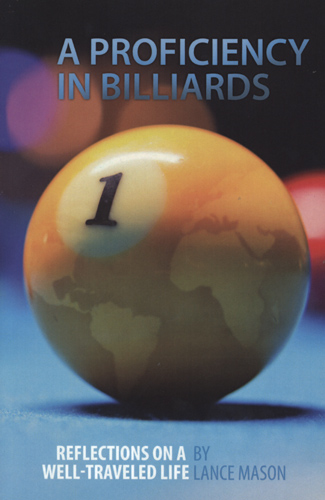 Pint-Size Publications, publisher of literary magazine Sport Literate, introduces their very first nonfiction, single-author book: A Proficiency in Billiards: Reflections from a Well-Traveled Life by Lance Mason. Mason first came to the editors’ attention with his essay “In the Lair of the Red Dragon,” published in an issue of Sport Literate earlier in the year.
Pint-Size Publications, publisher of literary magazine Sport Literate, introduces their very first nonfiction, single-author book: A Proficiency in Billiards: Reflections from a Well-Traveled Life by Lance Mason. Mason first came to the editors’ attention with his essay “In the Lair of the Red Dragon,” published in an issue of Sport Literate earlier in the year.
A Proficiency in Billiards, Mason’s first essay collection, takes readers from his home base in South California where he stood “eyewitness to pool hustlers and drag racers in the 1960s” to travels throughout the world, including New Zealand, Ireland, Greece, and Yugoslavia, just to name a few. Readers are invited along Mason’s travels, all from the comfort of their homes.
Keep an eye on Pint-Size Publications to see what they’ll have on tap next, and head to their website to order copies of A Proficiency in Billiards.
Spread the word!
Books :: The World According to Star Wars
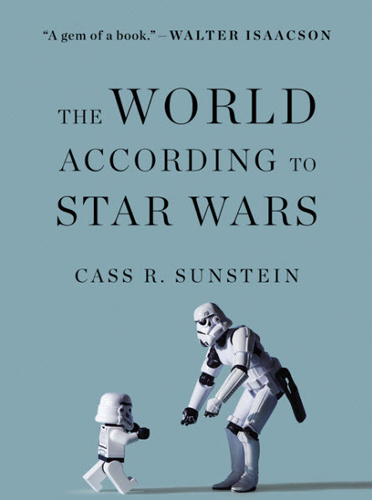 Author Cass R. Sunstein introduces his 2016 book, The World According to Star Wars (HarperCollins) humbly enough:
Author Cass R. Sunstein introduces his 2016 book, The World According to Star Wars (HarperCollins) humbly enough:
I’m going to be covering some diverse topics here, including the nature of human attachment, whether timing is everything, how to rank the seven Star Wars movies, why Martin Luther King Jr. was a conservative, how boys need their mothers, the workings of the creative imagination, the fall of Communism, the Arab Spring, changing understandings of human rights, whether The Force Awakens was a triumph or a disappointment, the limits of human attention, and whether Star Wars really is better than Star Trek.
With the exception of that last point, which I still find open to debate, one of the joys of this book is that Mr. Sunstein accomplishes the tasks he sets out in a quick reading, well-documented short book that combines playful romps of unabashed Star Wars fandom with high level reviews of politics, psychology, sociology, behavioral economics, and film critique. The book is engaging for nerfherders and Jedi Knights, alike.
[Guest post by Chris Curtis. Chris teaches psychology at Delta College: www.delta.edu/clcurtis.]
Spread the word!
Glimmer Train July/August 2016 Fiction Open
Glimmer Train has just chosen the winning stories for their July/August Fiction Open competition. This competition is held twice a year and is open to all writers. Stories generally range from 3000-6000 words, though up to 20,000 is fine. The next Fiction Open will take place in March. Glimmer Train’s monthly submission calendar may be viewed here.
 First place: Mark Fishman [pictured], of Paris, France, wins $3000 for “Songwad Road.” His story will be published in Issue 100 of Glimmer Train Stories.
First place: Mark Fishman [pictured], of Paris, France, wins $3000 for “Songwad Road.” His story will be published in Issue 100 of Glimmer Train Stories.
Second place: Jessica Johannesson Gaitán, of Bath, England, wins $1000 for “Bad Language.”
Third place: Jill Rosenberg, of Montclair, NJ, wins $600 for “16 Days of Glory.”
A PDF of the Top 25 winners can be found here.
Deadline soon approaching for the Short Story Award for New Writers: November 10
This competition is held quarterly and is open to all writers whose fiction has not appeared in a print publication with a circulation over 5000. No theme restrictions. Most submissions to this category run 1000-5000 words, but can go up to 12,000. First place prize wins $2500 and publication in Glimmer Train Stories. Second/third: $500/$300 and consideration for publication. Click here for complete guidelines.
Spread the word!
American Life in Poetry :: Emilie Buchwald
American Life in Poetry: Column 606
BY TED KOOSER, U.S. POET LAUREATE
Emilie Buchwald was the co-publisher and founding editor of Milkweed Editions in Minneapolis going on forty years ago, and that press grew up to become one of the finest literary publishers in our country. Today she edits children’s books at Gryphon Press, which she also founded. Here’s a lovely remembrance from her new book, The Moment’s Only Moment, from Nodin Press.
My Mother’s Music
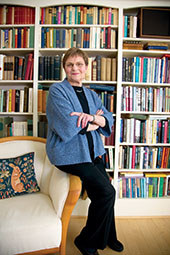 In the evenings of my childhood,
In the evenings of my childhood,
when I went to bed,
music washed into the cove of my room,
my door open to a slice of light.
I felt a melancholy I couldn’t have named,
a longing for what I couldn’t yet have said
or understood but still
knew was longing,
knew was sadness
untouched by time.
Sometimes
the music was a rippling stream
of clear water rushing
over a bed of river stones
caught in sunlight.
And many nights
I crept from bed
to watch her
swaying where she sat
overtaken by the tide,
her arms rowing the music
out of the piano.
We do not accept unsolicited submissions. American Life in Poetry is made possible by The Poetry Foundation (www.poetryfoundation.org), publisher of Poetry magazine. It is also supported by the Department of English at the University of Nebraska-Lincoln. Poem copyright ©2016 by Emilie Buchwald, “My Mother’s Music,” from The Moment’s Only Moment, (Nodin Press, 2016). Poem reprinted by permission of Emilie Buchwald and the publisher. Introduction copyright ©2016 by The Poetry Foundation. The introduction’s author, Ted Kooser, served as United States Poet Laureate Consultant in Poetry to the Library of Congress from 2004-2006.
Spread the word!
Why Don’t We Say What We Mean?
Lawrence Raab poses the question Why Don’t We Say What We Mean? as the title of his newest book. To answer the question, he dissects various poems and comments on their authors. The title was pulled from a 1931 essay by Robert Frost called “Education by Poetry: A Meditative Monologue.” Frost wrote: “People say, ‘Why don’t you say what you mean?’ We never do that, do we, being all of us too much poets.”
Spread the word!
Lost Words
Those who have read Muriel Barbery’s The Elegance of the Hedgehog might see echoes in Nicola Gardini’s Lost Words in that this later novel has main characters of a concierge, here called a “door woman” and an adolescent, here a thirteen-year-old. Chino/Luca is the doorwoman’s son and like in Barbery’s book, he finds inspiration for his intellect in someone living in the apartment building, here on the outskirts of Milan instead of Barbery’s Paris. Lost Words, however, is a darker view of the apartment dwellers and the labors of the narrator’s mother, which makes the unusual inspirers who enter the scene that much more exciting. In addition, the contrast between the intellectual newcomers and the backbiting and hypocritical tenants makes for drama and humor.
Spread the word!
The Myth of Water
To undertake a cycle of poems on the life of Helen Keller is to throw oneself at an interesting poetic problem: how to capture the perspective of one who lived in a wholly different perceptual world than most other people. To be sure, there are plenty of fine collections on the experiences of disability—Nick Flynn’s startlingly original Blind Huber comes to mind—but Helen Keller is a singular historical figure who, in our cultural imagination, bears a particular burden as the standout radical subject who, as if through magic, was able to speak from beyond an impassable veil.
Spread the word!
The Grass Labyrinth
Charlotte Holmes’s The Grass Labyrinth weaves an equally heartwarming and heartbreaking path through the intertwined lives of its characters. It explores the consequences of passion and the difficulties of an artistic life. The stories span thirty years and the consequences we read about unfold through generations of one painter’s wives, lovers, and children.
Spread the word!
The Borrowed World
The title of Emily Leithauser’s debut poetry collection, The Borrowed World, hints at the theme of impermanence that runs throughout the book. Whether it is the fleeting nature of childhood in the poem “Chest of Dolls” or the dissolution of a marriage in “Haiku for a Divorce,” Leithhauser gestures toward the price we pay as finite beings living in a world that is on loan to us. What is borrowed must eventually be returned. There is sadness in this, but sweetness and nostalgia too, for such fleeting moments of experience can be treasured precisely because they cannot be repeated.
Spread the word!
They Could Live with Themselves
They Could Live with Themselves by Jodi Paloni is a strong collection of short stories linked by the rural town of Stark Run, Vermont. The stories range in point of view and voice, from first-person perspectives of children to third-person point of view closely following a grandfather. Each story is self-contained yet enhanced by the others so that the collection ends with a clear picture of the New England town. Full of quiet tensions and unforgettable characters, Paloni’s collection presses into the daily conflicts and triumphs of the characters in ways that are both familiar and new.
Spread the word!
Deep Singh Blue
One of the gifts of great literature is to allow us passage into the lives of others unnoticed. Such is the case with Ranbir Singh Sidhu’s novel, Deep Singh Blue. His story takes us to a small town in northern California during the mid-1980s. It is the type of community where anyone “different” is sometimes cruelly focused upon. Being neither Hispanic nor African American, Sidhu’s hero, Deep Singh, is Indian. He is different from the usual different, which does not make his sixteen-year-old life any easier. He must come of age in a geography and culture very different from his land of origin, with parents who unabashedly refuse to adapt to their new country. Theirs is still a land of arranged marriages and caste systems and Deep Singh is plunged between two worlds.
Spread the word!
Sixty
If you’re lucky, you’ll get to experience your 60th birthday. Ian Brown did in 2014 and decided to begin a year of journaling he turned into a memoir titled, Sixty: A Diary of My Sixty-First Year. Here’s what he wrote on February 4th, his birthday: “At sixty [ . . . ] you are suddenly looking into the beginning of the end, the final frontier where you will either find the thing your heart has always sought, which you have never been able to name, or you won’t.” Then in May he wrote: “Lying in bed, I couldn’t overcome the fear that I have wasted my life, wrecked it, spoiled it.”
Spread the word!
Whiskey, Etc.
Forever keen on unearthing the wisdom within a tale, I embarked upon the reading of Whiskey, Etc. with the intention of gleaning some unmitigated truth, some absolutist’s insight into the complexity of the human condition. I even hoped to contain the elements of Sherrie Flick’s style within a box that was compact enough to easily carry. Yet, whatever it was that I deemed certain within one story dissolved the moment I turned the page to begin the next. The tangible was superseded by the ethereal; literality became symbolism. Just when I determined that Flick had set out to present snapshots of a single moment in time, unencumbered by the weight of meaning, I’d encounter a piece laden with melancholy or reminiscence. Plot was usurped by character, then character by plot.
Spread the word!
The Analyst
The person referenced in the title and pages of Molly Peacock’s book of poetry The Analyst is Joan Workman Stein, a New York practitioner who had a stroke in 2012 and later was able to resume her love of painting. Over a span of close to 40 years, the initial therapist-patient relationship between Peacock and Stein became a close and enduring friendship.
Spread the word!
Glimmer Train July/August 2016 Very Short Fiction Award
Glimmer Train has just chosen the winning stories for their July/August Very Short Fiction Award. This competition is held twice a year and is open to all writers for stories with a word count under 3000. The next Very Short Fiction competition will take place in March. Glimmer Train’s monthly submission calendar may be viewed here.
 1st place goes to Zehra Nabi of Baltimore, MD [Photo credit: Summer Greer], who wins $2000 for “Cow Killer.” Her story will be published in Issue 101 of Glimmer Train Stories. This will be the first print publication of her fiction.
1st place goes to Zehra Nabi of Baltimore, MD [Photo credit: Summer Greer], who wins $2000 for “Cow Killer.” Her story will be published in Issue 101 of Glimmer Train Stories. This will be the first print publication of her fiction.
2nd place goes to Mark Watkins of Lawrenceville, GA, who wins $500 for “What I Know About Where I’m From.”
3rd place goes to Hank Snelgrove of Nordland, WA, who wins $300 for “Fire in the Foam Bin.”
A PDF of the Top 25 winners can be found here.
Deadline soon approaching for the Short Story Award for New Writers: November 10
This competition is held three times a year and is open to all writers whose fiction has not appeared in a print publication with a circulation over 5000. No theme restrictions. Most submissions to this category run 1000-5000 words, but can go up to 12,000. First place prize wins $2500 and publication in Glimmer Train Stories. Second/third: $500/$300 and consideration for publication. Click here for complete guidelines.
Spread the word!
The Bitter Oleander Features Katherine Sánchez Espano
 The newest issue of The Bitter Oleander: A magazine of contemporary international poetry and short fiction, features an interview with and a selection of poetry from Katherine Sánchez Espano.
The newest issue of The Bitter Oleander: A magazine of contemporary international poetry and short fiction, features an interview with and a selection of poetry from Katherine Sánchez Espano.
Espano received her MFA from the University of Florida and has taught English and creative writing classes at several colleges. Her poetry has appeared in The Massachusetts Review, Green Mountains Review, The Bitter Oleander, Sycamore Review, and Spoon River Poetry Review, among others. Her work has also been included in the American Diaspora: Poetry of Displacement and Like Thunder: Poets Respond to Violence in America anthologies. In 2015, she published her first book of poetry, The Sky’s Dustbin, the winner of the 2014 Bitter Oleander Press Library of Poetry Book Award.
She is also a poet with the We Are You Project, an international organization “created to inform, enlighten, stimulate, and educate the public on the many facets and realities of Latino identity as it emerged over the past four centuries and continues to evolve in this, the 21st Century” through art exhibits, documentaries, poetry, lectures, and seminars.
Read an excerpt from the interview and one of her poems here.
Spread the word!
New Lit on the Block :: Heather
 “Heather is your friend. Heather is your girlfriend. Heather is your girlfriend’s girlfriend. Heather is leaning against the wall at your neighbor’s house party. Heather is next to you in bed, naked.”
“Heather is your friend. Heather is your girlfriend. Heather is your girlfriend’s girlfriend. Heather is leaning against the wall at your neighbor’s house party. Heather is next to you in bed, naked.”
Enticed? I certainly was, which is why I contacted Kelsey Mars, founder and sole editor of Heather, a new online indie literary publication, to learn more about this nakedness next to me in bed.
First – the name. “Heather,” Kelsey tells me, “is a unique feminine name, as well as being a shade of purple and a color generally associated with alternative sexuality. I wanted Heather as a publication to embody all aspects of this, to draw up images of bad girls in pleated skirts and the back row of the movie theater.”
Publishing fiction, non-fiction and poetry as well as digital art, photography and film, readers can determine whether or not the content stands up to its namesake. The free, online PDF features poems “about subjects that might make you uncomfortable,” Kelsey warns, as well as “erotica, film to chew on, stories about robots, flash fiction to make you cry a single diamond tear.”
While new to this venture, Kelsey is a seasoned literary professional. “I’ve been published in Huffington Post: Queer Voices, Thought Catalog, Miscellany, Meat For Tea and am upcoming in Painted Bride. You can read my original screenplay, Gotham Summer, as I tweet it out: @gothamsummer. I studied Media Theory and Communications at the College of Charleston, where I was first introduced to flash fiction writing. Since then, I’ve written two novels and more poems and flash fiction than is healthy for one person. In the light of day, I work on the Customer Experience team at Casper Sleep and preach the good word of Elizabeth Gilbert’s Big Magic: Never ask your art to pay for you.”
While involved in so much of her own writing,I asked Kelsey the motivation for adding this responsibility. “So many of us get rejection after rejection, often without knowing why. So many voices go unheard in this industry and it’s a damn shame. I started Heather to publish the weird stuff, the stuff that other publications might not see as ‘premium’ or literary enough. I wanted experimental stuff, the weirdest thing someone has ever written. I wanted a home for that stuff.”
Writers looking to home their works should know that Kelsey manages submissions on a rolling basis, accepting works as they fit the arc of each issue, offering the work more than one shot, but releasing it if it hasn’t found its fit after two issue cycles. Heather accepts simultaneous submissions, which keeps the editorial process timely.
Already, Heather has been made home by authors such as Maggie Cooper, whose first published pieces of fiction appeared in Heather and, as Kelsey notes: “totally blew my mind”; Monique Quintana, a fiction editor herself “whose shit haunts my dreams” Kelsey says; and Kirsten Bledsoe, a filmmaker whom Kelsesy knew prior to Heather, who has made both a feature length series about queer women of color and a prodigious ode to Marilyn Monroe’s poetry (which Heather published).
The future for Heather is boundless: “I want to go to Mars, dude,” Kelsey tells me with an edge of seriousness. “I want to see what’s outside of our solar system. Send me poems, fiction, art about that stuff. The stuff that we don’t even know yet. Let’s go to uncharted territory and live to brag about it.” Back down on earth, Kelsey hopes to publish Heather three times this year and keep the publication going well beyond that.
In addition to the regular publishing cycle, Kelsey is planning a special holday issue. The publication is not holiday themed, “but rather what you actually want to be reading when you’re avoiding your family over the holidays,” Kelsey says. “I’d like to publish more creative nonfiction in this issue, poetry about our fears, things like that.” Submissions accepted via Submittable; deadline November 27 to be published December 11.
As a final word, Kelsey encourages writers: “The most important thing I want people to take away from Heather is that you can do it to. You can publish the stuff YOU love. And if more of us do that, more of us will realize we’re someone’s favorite thing.”
Spread the word!
NER German Poetry in Translation
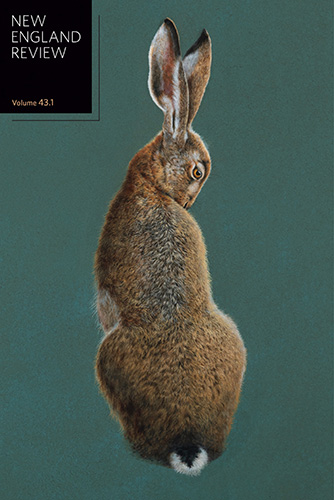 Crossing Through the Present: German Poetry in Translation is a special section in the current issue of Middlebury College’s New England Review (v37 n3). “The selection of writing from Germany assembled here,” writes Carolyn Kuebler, “came about as the result of both intention and accident—NER ’s ongoing intention to offer an inspiring, provocative range of literary voices, and the happy accident of our own Ellen Hinsey’s living for a time in Berlin. While there, Ellen read a particularly intriguing essay about poetry, notebook-keeping, and Hannah Arendt, and she suggested it would be worth translating for NER. . . She also met the essay’s author, the writer Marie Luise Knott, who offered to share her familiarity with the scene to help us choose a selection of new German poetry. Add to that a call for submissions, a series of meetings in Berlin cafés, and several time-zone-jumping phone calls, and the result is that this issue contains not only a multitude of voices from the English-speaking world, as always, but also a multitude of voices from the German-speaking world. They meet here in our pages.”
Crossing Through the Present: German Poetry in Translation is a special section in the current issue of Middlebury College’s New England Review (v37 n3). “The selection of writing from Germany assembled here,” writes Carolyn Kuebler, “came about as the result of both intention and accident—NER ’s ongoing intention to offer an inspiring, provocative range of literary voices, and the happy accident of our own Ellen Hinsey’s living for a time in Berlin. While there, Ellen read a particularly intriguing essay about poetry, notebook-keeping, and Hannah Arendt, and she suggested it would be worth translating for NER. . . She also met the essay’s author, the writer Marie Luise Knott, who offered to share her familiarity with the scene to help us choose a selection of new German poetry. Add to that a call for submissions, a series of meetings in Berlin cafés, and several time-zone-jumping phone calls, and the result is that this issue contains not only a multitude of voices from the English-speaking world, as always, but also a multitude of voices from the German-speaking world. They meet here in our pages.”
Two works, “Zakid’s Delicatessen, Bremen” by Peter Waterhouse (trans. Iain Galbraith) and “on classification in language, a feeble reader” by Uljana Wolf (trans. Sophie Seita), are available to read on the NER website along with Kuebler’s Editor’s Note for this issue.
Spread the word!
Books :: The End of Absence
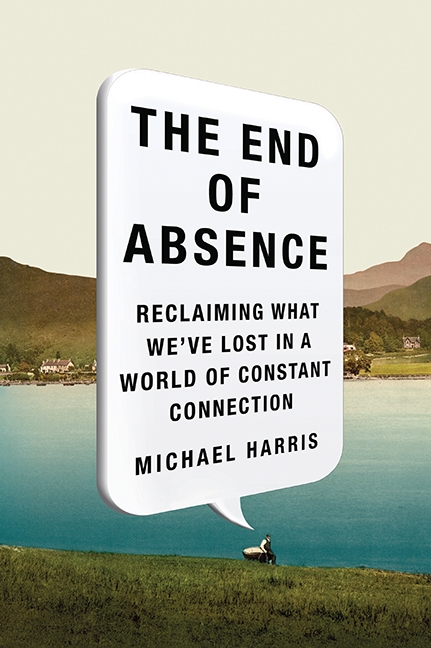 “I wanted to remember the absences that online life had replaced with constant content, constant connection. I’ve remembered what it is to be free in the world, free from the obliterating demands of five hundred ‘contacts.’”
“I wanted to remember the absences that online life had replaced with constant content, constant connection. I’ve remembered what it is to be free in the world, free from the obliterating demands of five hundred ‘contacts.’”
Author Michael Harris shares this journal entry near the end of an “Analog August” (a self-enforced month without a smartphone and other internet devices) in his 2014 book, The End of Absence: Reclaiming What We’ve Lost in a World of Constant Connection (The Penguin Group). Mr. Harris examines the loss of absence from the perspective of the digital immigrant generation—those of an age to recall life both before and after the ubiquitous online world. Do you remember what it was like to cast an empty gaze out the window of the car on a long family trip? To vaguely wonder what the couple down the street was discussing as you waited for your bus? Do you remember being alone with your thoughts and just . . . being? Mr. Harris takes a digital immigrant journey of exploration through our technology-infused society and technology-induced angst, culminating in his own attempt to recapture absence.
Spread the word!
CutBank 2016 Contest Winners
CutBank Literary Journal #85 features the winners of the 2016 genre contests:
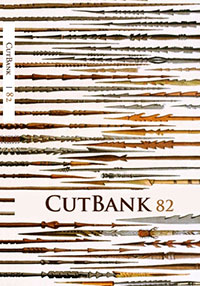 Montana Prize in Fiction
Montana Prize in Fiction
Selected by Claire Vaye Watkins
“Crick” by Terrance Manning, Jr.
Montana Prize in Creative Nonfiction
Selected by Amanda Fortini
“Meme” by Tracy Fuad
Patricia Goedicke Prize in Poetry
Selected by Oliver De La Paz
Three Poems by J.R. Toriseva
Spread the word!
Lit Mag Covers :: Picks of the Week
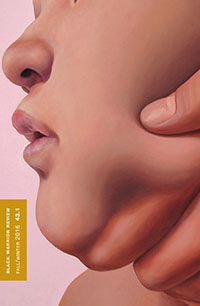 I think Black Warrior Review covers make the pick every issue, with Luanne Redeye’s (Self)Image on the Fall/Winter 2016 cover just another example of why. More from her “Genre Paintings 2011 – ” series can be found inside the publication, as well as here on her website.
I think Black Warrior Review covers make the pick every issue, with Luanne Redeye’s (Self)Image on the Fall/Winter 2016 cover just another example of why. More from her “Genre Paintings 2011 – ” series can be found inside the publication, as well as here on her website.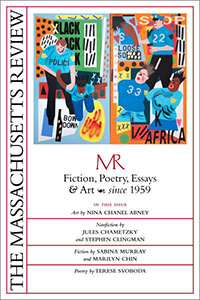 The cover of The Massachusetts Review (v57 n3) features Nina Chanel Abney’s What, 2015 (unique ultrachrome pigmented print, acrylic, spray paint on canvas). More of her work is also featured in the publication and can be viewed in her online portfolio here.
The cover of The Massachusetts Review (v57 n3) features Nina Chanel Abney’s What, 2015 (unique ultrachrome pigmented print, acrylic, spray paint on canvas). More of her work is also featured in the publication and can be viewed in her online portfolio here.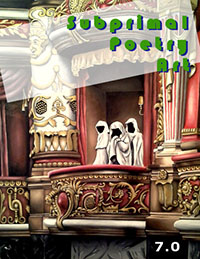 The cover of the seventh issue of Subprimal Poetry Art features Three Shadows by Kate Viola, who says the painting was “inspired by the haunting arias often found in operas.” Subprimal Poetry Art is a open access online publication of words with music, words alone, and artwork.
The cover of the seventh issue of Subprimal Poetry Art features Three Shadows by Kate Viola, who says the painting was “inspired by the haunting arias often found in operas.” Subprimal Poetry Art is a open access online publication of words with music, words alone, and artwork.
Spread the word!
Poem :: Erica Goss
Father Fragments
by Erica Goss
Once a week I wipe the dust from the lid,
tilt the little jar of ashes
and watch them settle. Where
is his giant bark of a laugh,
his hand smacking the table
so hard my plate jumped?
Night after night he voiced
all the parts in Huckleberry Finn. . .
[read the rest and more on gravel]
Spread the word!
Craft :: Translating Feelings into Writing
 “Nobody wants to feel everything, just as nobody wants to read work by a writer who is emotionally incontinent. In real life, I may be strung out on anxiety, or aching from bad news, or jubilant, or missing someone I love. However, I know that my job is not to directly transmit those emotions to the reader. My job is to live my life, feel my feelings, and then learn to translate what I’m feeling without making it about me.”
“Nobody wants to feel everything, just as nobody wants to read work by a writer who is emotionally incontinent. In real life, I may be strung out on anxiety, or aching from bad news, or jubilant, or missing someone I love. However, I know that my job is not to directly transmit those emotions to the reader. My job is to live my life, feel my feelings, and then learn to translate what I’m feeling without making it about me.”
From “Emotion is Not Plot: Using Detachment to Create Powerful Fiction” a craft essay by Claire Rudy Foster in the online journal Cleaver Magazine.
Spread the word!
Brilliant Flash Fiction Contest Winners
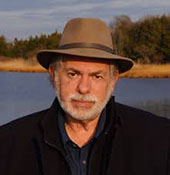 Published online quarterly the last day of January, March, June, and September, Brilliant Flash Fiction holds several writing contests per year, often with a prompt, none with a fee, and each with a cash prize. The most recent was “Special Delivery” judged Paul Beckman [pictured]. Of the 287 international writers who entered, the top three prize winners and shortlist can all be read online here.
Published online quarterly the last day of January, March, June, and September, Brilliant Flash Fiction holds several writing contests per year, often with a prompt, none with a fee, and each with a cash prize. The most recent was “Special Delivery” judged Paul Beckman [pictured]. Of the 287 international writers who entered, the top three prize winners and shortlist can all be read online here.
Winners
First: “It Came in the Mail” by Damhnait Monaghan
Second: “Princess Party” by Jennifer Stuart
Third: “The Secret of the Snoring Time” by Elizabeth Fisher
Spread the word!
bioStories – Winter/Spring 2016
It’s overwhelming to think of the number of people we see daily and try to imagine their individual lives, their hidden stories. John Koenig calls the sudden realization of everyone having their own story “sonder,” and bioStories lends a hand in coping with sonder by giving readers nonfiction glimpses into the lives and stories of those around us. New work is added to the website weekly, with two PDF anthologies of this work released per year.
Spread the word!
Jersey Devil Press – October 2016
With Halloween around the corner, Jersey Devil Press’s new issue was especially enticing this month, promising to quench my thirst for spooky, strange stories to read in the dark.
Spread the word!
The MacGuffin – Spring/Summer 2016
Alfred Hitchcock once said: “No film is complete without a MacGuffin” because that’s what “ . . . everybody is after.” A MacGuffin, which is a literary device originating from Victorian England, is an object that moves the plot forward in a work of fiction. The MacGuffin, which is a literary magazine published out of Schoolcraft College in Michigan, is an impressive collection of poetry and fiction for your reading pleasure. The collected works of this issue explore a wide range of voices examining the human experience. Editor Steven Alfred Dolgin says: “I have long believed that there is a correspondence between our internal, subjective landscape and that of our external, objective landscape. The selections in this MacGuffin issue do nothing to deter from that perspective.” The landscape within this magazine is vast and exciting to explore.
Spread the word!
TQ Review – June 2016
The first issue of TQ Review defines itself as “a journal of trans and queer voices.” These are authors speaking from their experiences and divulging their fears. The authors don’t share victim stories or stories of triumph, but everything in between. These are the stories of people within the trans and queer communities laying bare their fears and vulnerabilities.
Spread the word!
Lady Churchill’s Rosebud Wristlet – July 2016
Nicole Kimberling has done the research and found that “some pumpkins would rather not be pie. Four out of ten gourds interviewed [ . . . ] stated they would much rather be processed into a savory dish.” Kimberling’s recipe for Pumpkin Mushroom Moussaka is just one of the ways Lady Churchill’s Rosebud Wristlet (LCRW) expands the definition of speculative literature. This issue combines dark themes with lighthearted wonder, and stunning world building with bizarre absurdism.
Continue reading “Lady Churchill’s Rosebud Wristlet – July 2016”
Spread the word!
Brevity Special Issue: Race, Racism, and Racialization
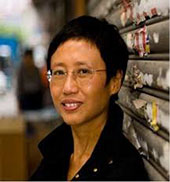 Issue 53 Fall 2016 of Brevity is a special issue on Race, Racism, and Racialization and includes such essays and authors as “Black in Middle America” by Roxanne Gay, “A Pop Quiz for White Women Who Think Black Women Should Be Nicer to Them in Conversations about Race” by Deesha Philyaw, “How to Discuss Race as a White Person” by Samuel Stokley, “Things People Said: An Essay in Seven Steps” by Sejal Shah, “How to Erase an Arab” by Julie Hakim Azzam, and “Mexican Americans and American Mexicans: An Etymology” by Sarah A. Chavez.
Issue 53 Fall 2016 of Brevity is a special issue on Race, Racism, and Racialization and includes such essays and authors as “Black in Middle America” by Roxanne Gay, “A Pop Quiz for White Women Who Think Black Women Should Be Nicer to Them in Conversations about Race” by Deesha Philyaw, “How to Discuss Race as a White Person” by Samuel Stokley, “Things People Said: An Essay in Seven Steps” by Sejal Shah, “How to Erase an Arab” by Julie Hakim Azzam, and “Mexican Americans and American Mexicans: An Etymology” by Sarah A. Chavez.
The online journal also includes guest editors for this issue Joy Castro and Ira Sukrungruang in conversation with one another about “what they hoped for and what they learned” in putting this issue together, as well as the accompanying craft essay “Three Commandments for Writing About Race” by Xu Xi [pictured].
Spread the word!
3Elements Review
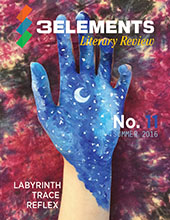 3Elements Review is an online quarterly literary journal publishing fiction, nonfiction, poetry, art, and photography. Unique to this publication, submissions for each issue must include the three elements the publishers post in advance. Past issue elements include: labyrinth, trace, reflex; measure, cleaver, silver; mania, tower, exposure.
3Elements Review is an online quarterly literary journal publishing fiction, nonfiction, poetry, art, and photography. Unique to this publication, submissions for each issue must include the three elements the publishers post in advance. Past issue elements include: labyrinth, trace, reflex; measure, cleaver, silver; mania, tower, exposure.
The most recent issue (Fall 2016 #12) features the elements passageway, relic, kiss. “When we first chose the elements for this issue . . .” write the editors, “we worried that this specific trio of words would be a bit too leading. Would we get dozens of submissions about alluring, illicit affairs, kisses stolen along the shadowy hallways of castles and cathedrals? As it turned out – the answer was no. This issue is filled with writers and artists who surprised us, who made us see and consider the elements in ways we never had before, and we are honored to be able to share their work with you all.”
The elements for Issue 13 are THREAD, GLAZE, MURMUR with a submission deadline of October 31.
Spread the word!
October 2016 Get Broadsided
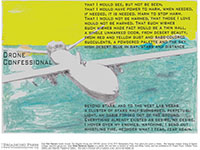 “Drone Confessional” a collaborative broadside with a poem by Kim Garcia and art by Helen Beckman Kaplan is the Broadsided poster for October 2016. Broadsided Press provides the opportunity for writers and artists to come together to create a work to share with Vectors – people who then download the free PDF and post it around their neighborhood, workplace, or travel destination. Each month’s writer and artist also provide commentary on their pieces and the collaborative process.
“Drone Confessional” a collaborative broadside with a poem by Kim Garcia and art by Helen Beckman Kaplan is the Broadsided poster for October 2016. Broadsided Press provides the opportunity for writers and artists to come together to create a work to share with Vectors – people who then download the free PDF and post it around their neighborhood, workplace, or travel destination. Each month’s writer and artist also provide commentary on their pieces and the collaborative process.
If you’d like to be a Vector, all you need to do is print and post the broadside. Broadsided Press would also like to encourage colleges and universities to start their own broadside collaborations! Visit their website here for more information.
Spread the word!
Hotel Amerika Transgenre Contest Winners
Hotel Amerika promotes itself as a publication for “writing in all its forms. . . traditional work alongside the experimental. We strive to house in our pages the most unique and provocative poetry, fiction and nonfiction available. Work with a quirky, unconventional edge—either in form or content—is often favored by our editors. Hotel Amerika is an eclectic journal that attracts an equally eclectic audience.” To that end, last year they held a Transgenre Writing Contest, the winners featured in their Spring 2016 issue.
1st Place
Sarah Minor, “Nest”
2nd Place
Dana Curtis, ” Two Films”
Honorable Mention
adrian nichols, “lexicon of anarchy, no. xxii”
Sophie Monatte, “Fragments”
Other writers who works are included in the Transgenre section: Jessica Hollander, Julia Brennan, Katherine Riegel, Elizabeth Bryer, Lisa Samuels, Amy Newman, and Sara Biggs Chaney.
Spread the word!
Books :: 2016 Akrilica Series
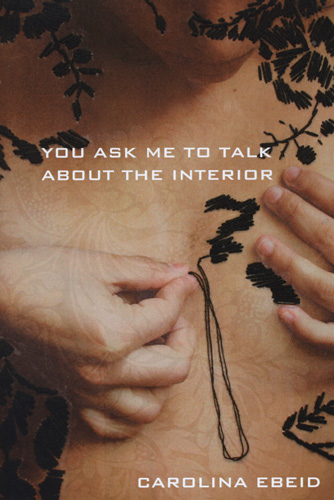 Since 2013, Noemi Press and Letras Latinas (the literary imitative at the Institute for Latino Studies at the University of Notre Dame) have been co-publishing under the Akrilica Series to showcase innovative Latino writing.
Since 2013, Noemi Press and Letras Latinas (the literary imitative at the Institute for Latino Studies at the University of Notre Dame) have been co-publishing under the Akrilica Series to showcase innovative Latino writing.
You Ask Me To Talk About the Interior by Carolina Ebeid joins the ranks of the Akrilica Series, published in September 2016. Ebeid’s first book, You Ask Me To Talk About the Interior has been called “a book of listening and responding and listening again” (Shane McCrae) that uses “[t]he voice of a mother, of lover, of friend” (Julie Carr).
More information about the book and the series can be found at the Noemi Press website.
Spread the word!
Ruminate 2016 Prize Winners
The Fall 2016 issue of Ruminate features winners and select honorable mentions and finalists from their 2016 contests:
2016 Janet B McCabe Poetry Prize
Judge Alice Fulton
FIRST PLACE: “Yellow” by Melissa Reeser Poulin
SECOND PLACE: “Small Implosions” by Barbara Ellen Sorensen
HONORABLE MENTION: “The Lord, Walking in the Evening” by Michael Schmidtke and “Deer Apples” by Sally Thomas
Spread the word!
Books :: October Award Winners
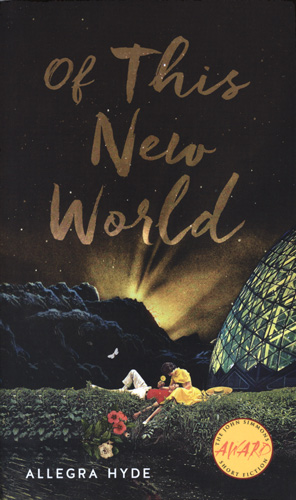 With October here, it’s time to announce a couple of the award-winning books slated for publication this month.
With October here, it’s time to announce a couple of the award-winning books slated for publication this month.
Winner of the 2016 John Simmons Short Fiction Award, Of This New World by Allegra Hyde, hit the shelves earlier this month. The collection starts at the Garden of Eden and ends on a Mars colony, each story wrestling with “conflicts of idealism and practicality, communal ambition and individual kink,” and asking the fundamental human question: “Is paradise really so impossible?” Of This New World is Hyde’s first collection, and it’s now available at the University of Iowa Press website (now currently on sale for the frugal reader!).
Love Give Us One Death: Bonnie and Clyde in the Last Days by Jeff P. Jones is the winner of the 2015 George Garrett Fiction Prize. Final Judge Tracy Daugherty says the book of the two famous outlaws shows “larger dimensions: the spiritual shadows and compulsive needs from which our nation springs and through which it has found its many forms of speech.” This is Jones’s first book, and copies are available from the Texas A&M University Press website.
Spread the word!
Able Muse New Poetry Editor
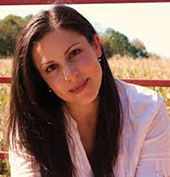 Able Muse has announced that Nicole Caruso Garcia has joined their staff as Assistant Poetry Editor, replacing the departing Richard Meyer. Nicole Caruso Garcia was born grew up in New Jersey and Connecticut, earned her B.A. in English from Fairfield University, and an M.S. in Education from University of Bridgeport. She was a 2006 Summer Institute Fellow of the Connecticut Writing Project and currently teaches poetry and creative writing at Trumbull High School in Connecticut. Her poetry has appeared in Mezzo Cammin, Willow Review, The Raintown Review, The Sow’s Ear Poetry Review, Soundings East, The Ledge, Poetry Midwest, and Small Pond Magazine of Literature, and she received the Spring 2010 Willow Review Award. But, to show her ability to flex poetic styles, while she tends toward formalist poetry, “her rapping alter ego, Capital G, often visits to bust a rhyme for her students.” We at NewPages can dig it.
Able Muse has announced that Nicole Caruso Garcia has joined their staff as Assistant Poetry Editor, replacing the departing Richard Meyer. Nicole Caruso Garcia was born grew up in New Jersey and Connecticut, earned her B.A. in English from Fairfield University, and an M.S. in Education from University of Bridgeport. She was a 2006 Summer Institute Fellow of the Connecticut Writing Project and currently teaches poetry and creative writing at Trumbull High School in Connecticut. Her poetry has appeared in Mezzo Cammin, Willow Review, The Raintown Review, The Sow’s Ear Poetry Review, Soundings East, The Ledge, Poetry Midwest, and Small Pond Magazine of Literature, and she received the Spring 2010 Willow Review Award. But, to show her ability to flex poetic styles, while she tends toward formalist poetry, “her rapping alter ego, Capital G, often visits to bust a rhyme for her students.” We at NewPages can dig it.
Spread the word!
CNF 3rd Readers’ Choice Theme Issue
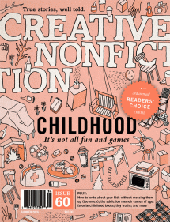 Continuing an annual tradition started three years ago, Creative Nonfiction presented a list of topics to its newsletter subscribers and social media followers and had them vote for the ones they liked best. “Mistakes” was the first issue (#53), followed the next year by “Waiting” (#56), and now, for 2016, “Childhood” (#60), with the subtitle: “It’s not all fun and games.” Each Readers’ Choice issue also includes a Best Essay contest. Readers can access on the CNF website the winning essay, “The Walk Home” by Judith Barrington, and an interview with Barrington; “Before We’re Writers, We’re Readers” by Randon Billings Noble – 15 nonfiction authors on the true (or mostly true) stories they read as kids; Lee Gutkind’s introduction; and two additional pieces: “I Survived the Blizzard of ’79” by Beth Ann Fennelly and “Writing Motherhood” by Marcelle Soviero.
Continuing an annual tradition started three years ago, Creative Nonfiction presented a list of topics to its newsletter subscribers and social media followers and had them vote for the ones they liked best. “Mistakes” was the first issue (#53), followed the next year by “Waiting” (#56), and now, for 2016, “Childhood” (#60), with the subtitle: “It’s not all fun and games.” Each Readers’ Choice issue also includes a Best Essay contest. Readers can access on the CNF website the winning essay, “The Walk Home” by Judith Barrington, and an interview with Barrington; “Before We’re Writers, We’re Readers” by Randon Billings Noble – 15 nonfiction authors on the true (or mostly true) stories they read as kids; Lee Gutkind’s introduction; and two additional pieces: “I Survived the Blizzard of ’79” by Beth Ann Fennelly and “Writing Motherhood” by Marcelle Soviero.
